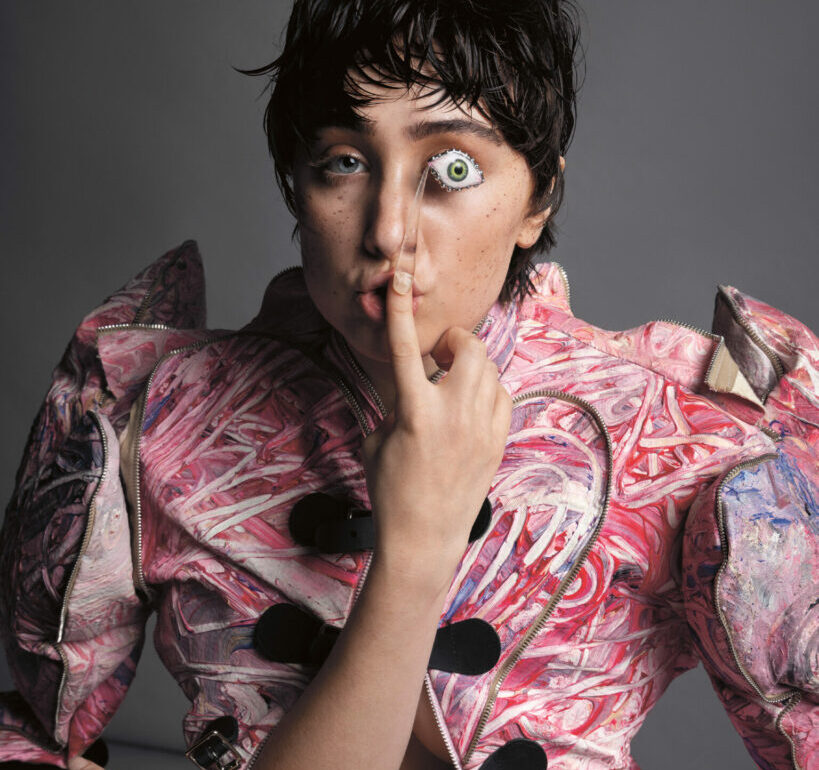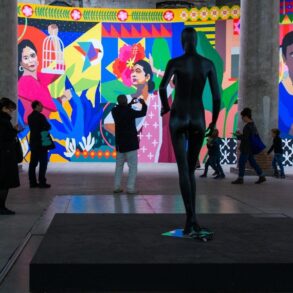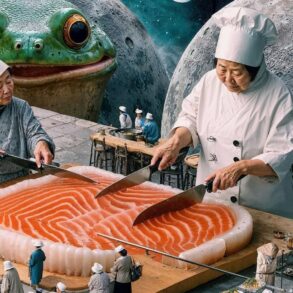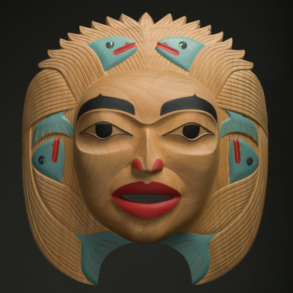Do you want to bedazzle my grinder?” Chappell Roan is standing in front of a vintage armoire, holding the silver weed-crushing tool and contemplating what to do today. It’s a hot, gorgeous July Friday, and she has a rare day off in between her increasingly viral festival -performances. The crimson curls that usually fall to her lower back are pinned up, her face bare except for a swipe of black liner around her eyes. In lieu of, say, a pink cowgirl suit or a Hannah Montana wig or a latex wrestling uniform, all of which she’s worn onstage, she’s opted for grey cargo trousers and a matching body-suit. “I wear grey and black IRL because I can’t handle the shit that I wear [onstage],” she says. The markings of her pop alter ego are all over the cosy, one-bedroom house she recently began renting in a quiet suburban neighbourhood outside Los Angeles. Here in the makeshift craft room, just opposite the armoire, is a mannequin that acts as a Chappell Roan stand-in. Today it’s dressed in the sheer, seafoam kimono from her ‘Casual’ video and the Statue of Liberty wig from her recent set at Governors Ball in New York. Roan is not fully settled in here. There are vintage lamps and half-unpacked boxes on the floor, sitting near bags of Anastasia Beverly Hills makeup. But there are also just enough touches to make it feel like a home, like the jadeite salt and pepper shakers on the dining table or a couple of small, pastel-hued watercolour paintings on the wall. It feels safe and warm for a house that’s as new as the life she’s suddenly living.
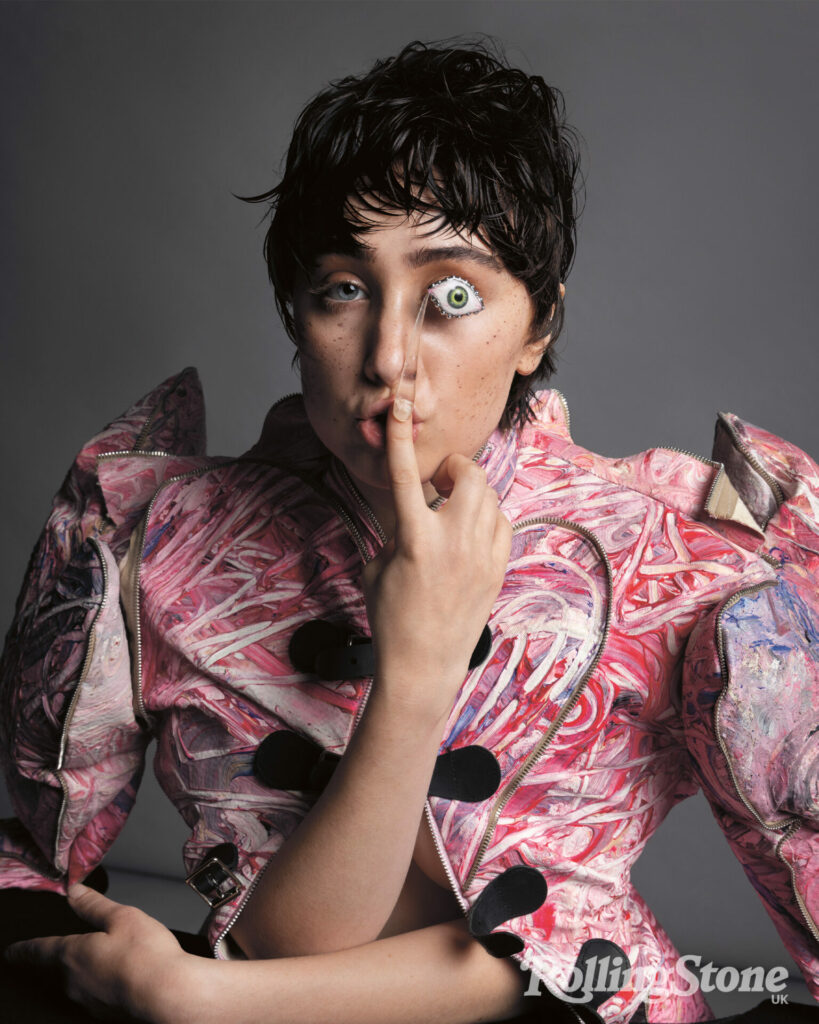
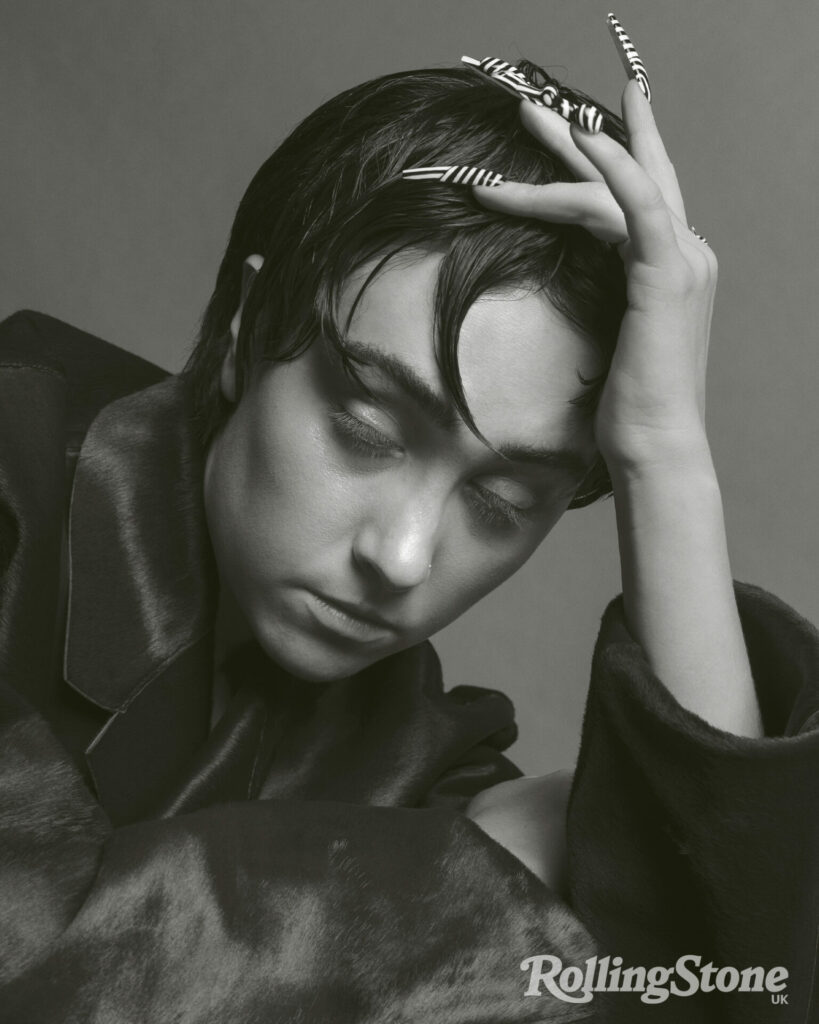
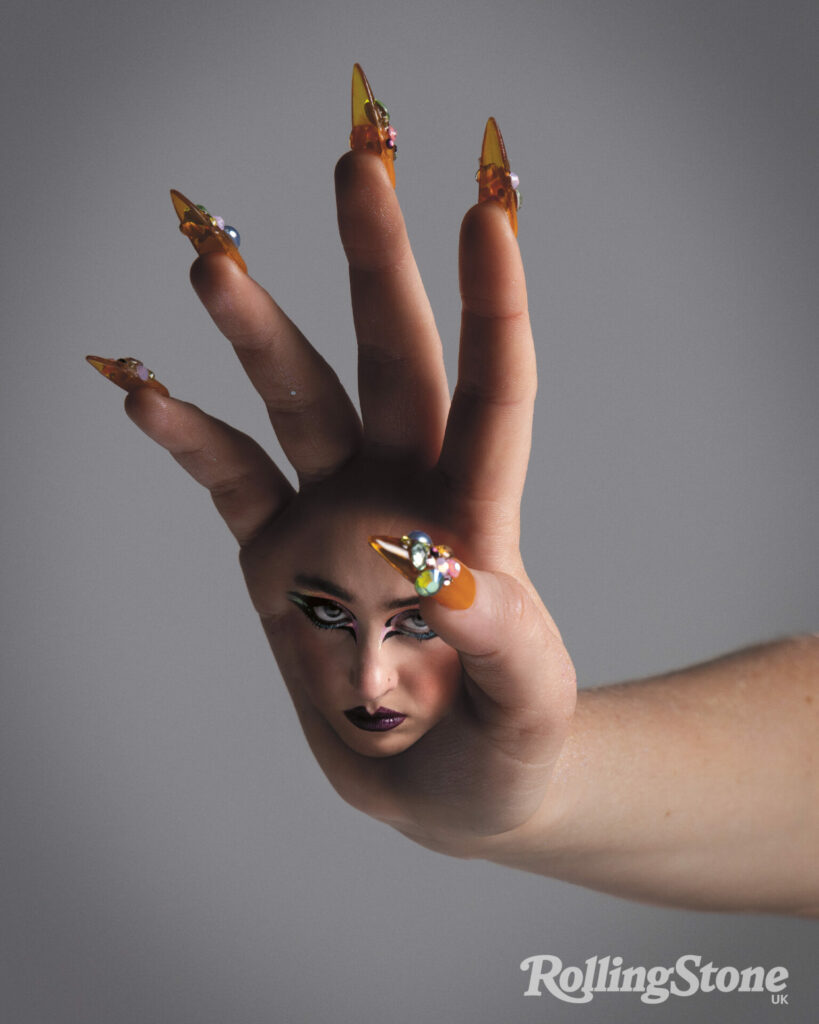
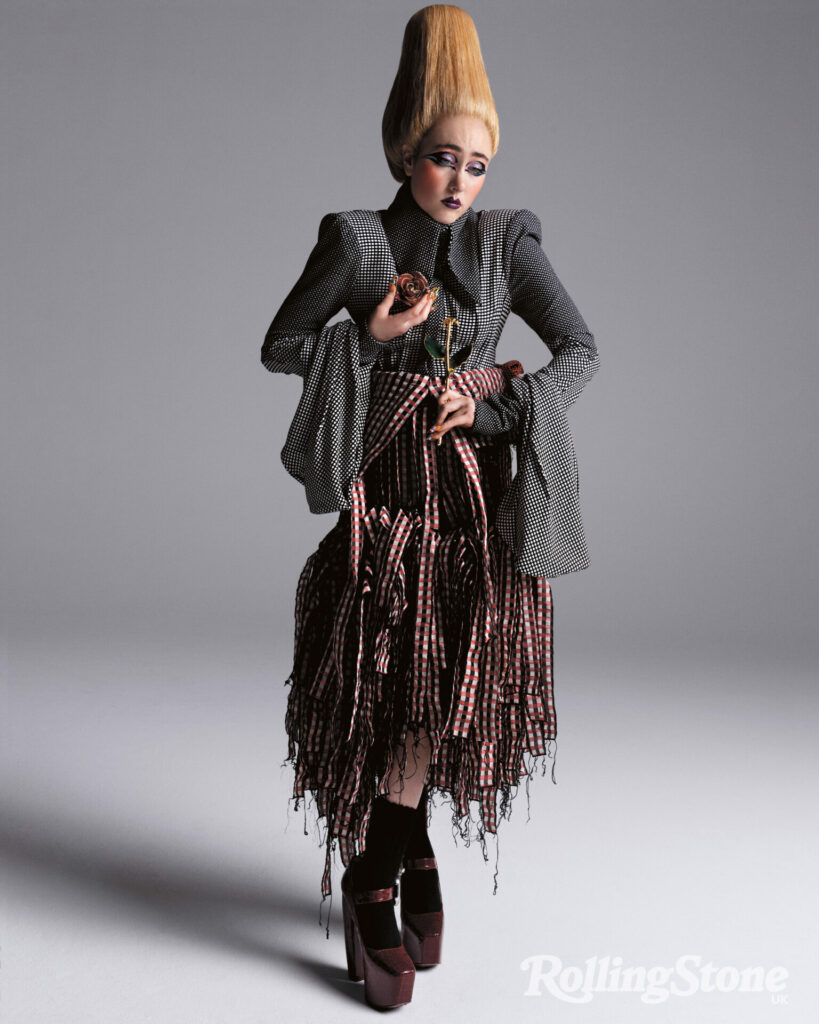
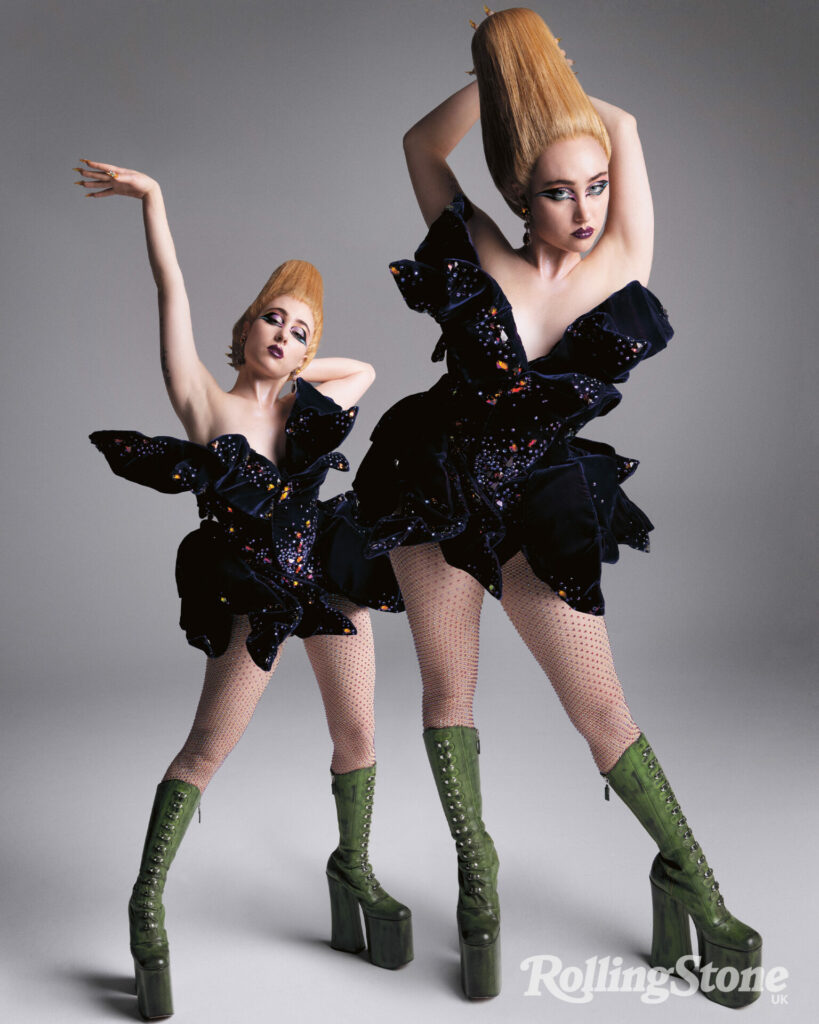
(Picture: Inez & Vinoodh)
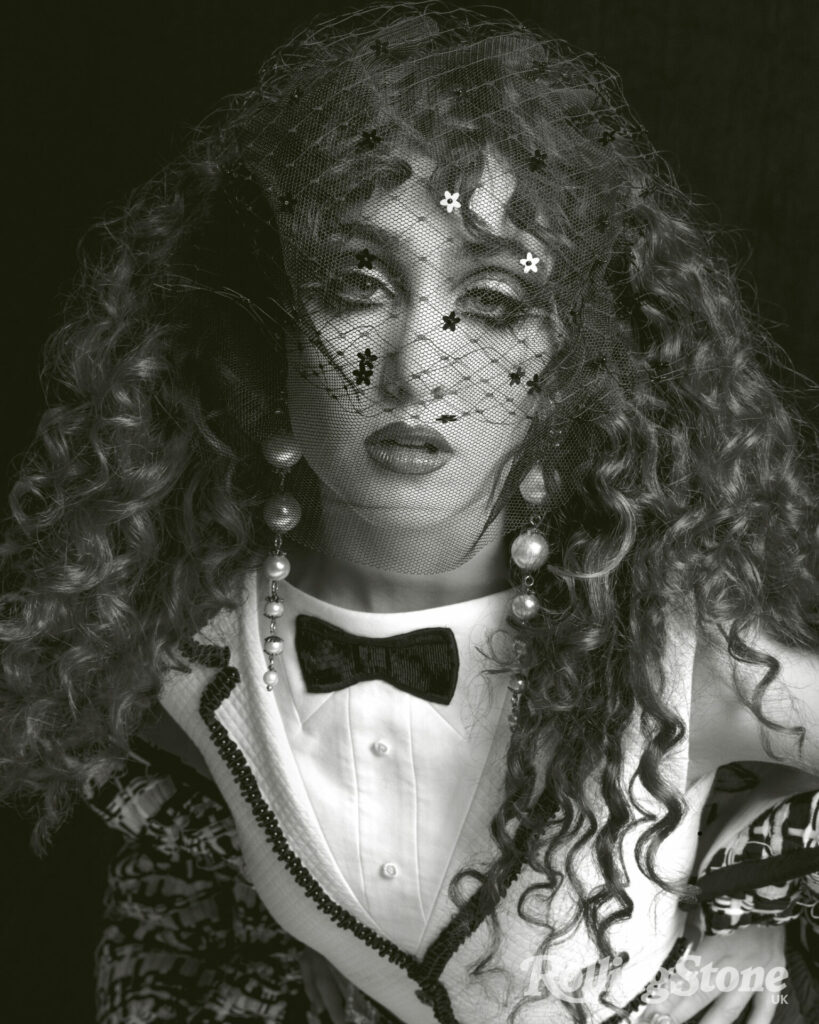
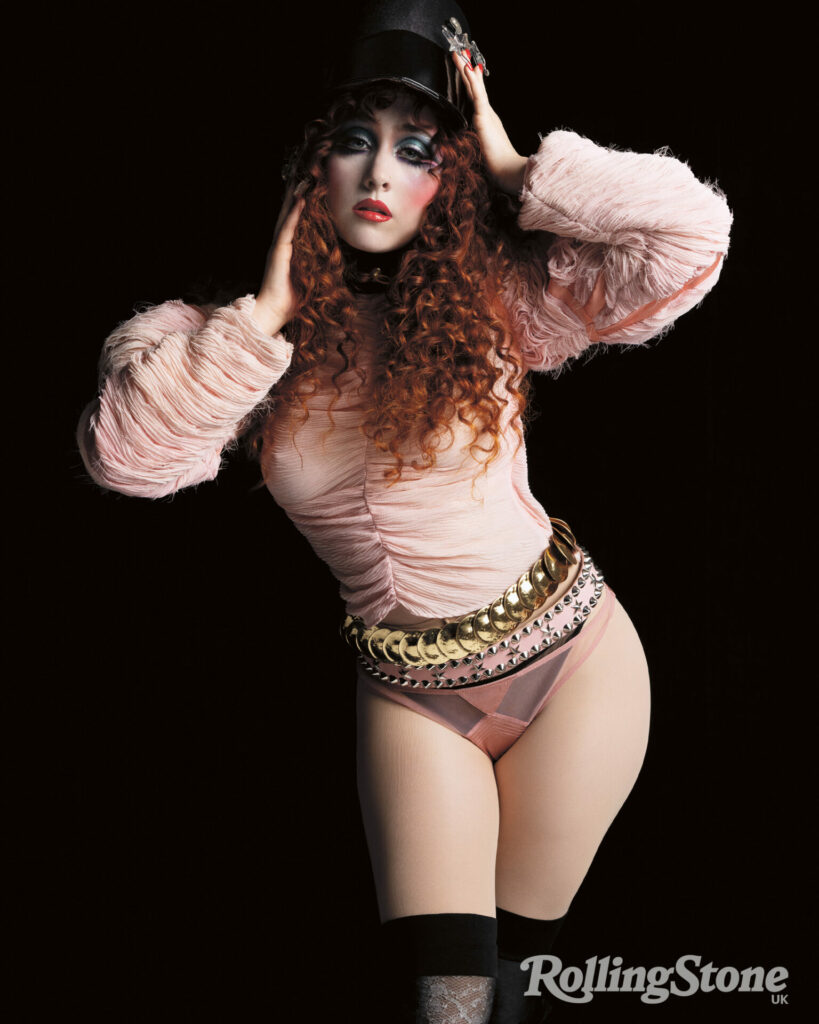
Since this spring, Roan has experienced the kind of rise that makes words like ‘meteoric’ feel quaint. Back in April, she wrapped a stretch of dates opening for her friend Olivia Rodrigo. The tour gave momentum to Roan’s fun, insanely memorable debut, The Rise and Fall of a Midwest Princess, released last September. Then came Coachella. Like the rest of the performances that weekend, Roan’s afternoon set was broadcast live on YouTube, and while thousands watched in person, millions more were glued to their screens, sharing and reacting to clips on social media in real time.
All those eyes watched Roan debut a new single, ‘Good Luck, Babe!’ The song — about being in love with another girl who is not quite ready to accept that she even likes girls — would soon become Roan’s biggest hit yet, a tale of queer-girl yearning lifted, in typical Roan fashion, by 80s synths and a big, bold, thoroughly awesome chorus sung entirely in falsetto. When she returned for Coachella’s second weekend, to an even bigger crowd than the first, Roan showed up as a bright-pink butterfly, stared down the barrel of the camera while calling herself “your favourite artist’s favourite artist” (a nod to “your favourite drag queen’s favourite drag queen,” Sasha Colby), told everyone, “I’m gonna serve exactly what you are … cunt!” and generally delivered the kind of goose-bump-giving, star-making, history-in-real-time performance that doesn’t often happen these days. And her life hasn’t been the same since.
“I’m still trying to catch up,” Roan says, sitting at her dining table with her glue gun plugged in. She’s pulled a white utility trolley between us; it’s filled with enough crafting materials to make a primary-school teacher drool with envy. With Norah Jones softly playing off her phone, Roan lays out sheets of gems and rhinestones that she’ll spend the next three hours meticulously gluing to the grinder, in between sips of the Bella Hadid smoothie from Erewhon. “I can’t really sleep that well because I have insomnia,” she says. “It’s just so hard to chill. It’s been a really hard adjustment.”
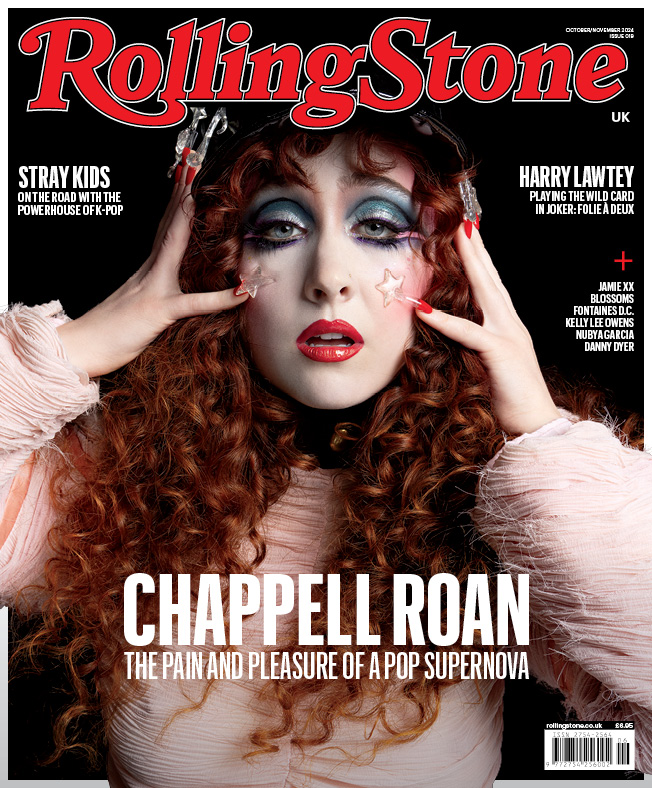
After Coachella, the iconic moments kept coming. In June, at Gov Ball, Roan was rolled out in a big red apple, dressed as Lady Liberty while coolly smoking a very large joint; the photos and videos dominated social feeds. She may have had the biggest crowd ever for a Lollapalooza set, and she wasn’t even a headliner. Singles, including one released back in 2020, have begun charting. ‘Pink Pony Club’, a sparkling power-pop moment with two guitar solos and an unforgettable chorus about a girl leaving Tennessee to dance at a gay bar on Santa Monica Boulevard, has become a dancefloor staple. 2022’s ‘Casual’ has blown up on TikTok. The cheerleader-inspired ‘Hot to Go!’ can be heard at baseball games; even the bros know its ‘YMCA’-style dance.
After Gov Ball, Roan noticed, “I was getting almost a hundred thousand followers a day. At first, I was in severe denial,” she recalls. “They would literally show me some stats and the only thing I could do is say, ‘No, no, no. It’s not like that.’ I couldn’t say, ‘I am gaining success.’” In early August, The Rise and Fall of a Midwest Princess hit number one in the UK charts.
This year, as pop music entered a moment when fans seemed particularly inclined to dance, party and have fun, Roan was waiting for them. She had been writing huge anthems and creating her own drag persona. She manages to feel larger-than-life, but also raw, real and tangible — a Midwest princess, “the pop star of Goodwill”, as she put it.
“I remember her walking into the studio one day and just flat-out saying ‘I don’t give a fuck about what people say anymore. If I like it, then it’s good,’” says Rodrigo. “I could tell she actually meant it, too. That’s her magic.”
And while Roan may seem like an overnight success to some, her career has been nearly a decade in the making, against innumerable odds. Four years ago, she had been dropped from her first label and left to pick up the pieces. But after a brief but crucial journey as an independent artist, Roan learned the value of trusting her own gut: she started to write songs that evoke queer joy and found a massive fandom along the way. “What’s so infuriating is how people are just now taking me seriously,” she says. “Like, ‘You know what, bitch? I’ve been doing this shit and you’re just now catching up.’”
Still, Roan never anticipated it would get this big. “Normal” as she once knew it no longer exists. As a working artist, she was happy to just see the shows grow. Now, she’s facing mounting pressure to not only live up to the person her fans want her to be but to also figure out if and how she wants to keep things running at such a massive level. “Part of me hopes I never have a hit again because then no one will ever expect anything from me again,” she says, quietly.
But there’s another part of Roan, the girl whose career nearly killed her more than once, that still wants to fight to make this work. She’s survived worse. “It’s my dream job,” she says. “I never know if it’s going to be like this ever again, which is kind of scary.”
In the middle of the Ozarks, the Midwestern mountain range known for its natural beauty and conservative communities, sits Willard, Missouri. The town’s population recently rose to just over 6,500. In 1998, Kayleigh Rose Amstutz was born in Willard; before she became Chappell Roan, her high school was best known for having two graduates who competed in the Olympics (in volleyball and track and field). Her mother, a vet, and her dad, a registered nurse, were 23 and in college when they had her, the oldest of four. Kayleigh, as she explains, was difficult to raise: angry, depressed, defiant, emotional, manipulative, mean. “I felt so miserable for my whole childhood,” she says. She would talk back and constantly get in trouble. “All my parents could do was try their best.”

Much later, she would be diagnosed with bipolar II disorder. As a teen, she had outlets, at least, that would temper her then-undiagnosed mental illness. She loved the outdoors and loved to craft. She was also an athlete, running at a state-competition level, and she almost went to college for cross-country. Kayleigh was pretty introverted back then. She made her own clothes and couldn’t find community with even the class weirdos. “I was just a freak and really shy and self-conscious and modest,” she says. “The pendulum swung so far when I started writing pop music because I was like, ‘I have to do my inner child justice and just be free.’”
At age 13, she sang publicly for the first time at a talent show, and won, then won again the next year. Two years after that, she wrote her first song, about a boy she liked. They were the religious Midwestern version of star-crossed lovers: she grew up non-denominational Christian; her crush came from a devout Mormon family that looked down on dating outside the faith. When he was preparing to go on his mission, she was distraught and got her feelings out in a five-minute “boring ballad”.
Kayleigh and her Mormon crush didn’t work out. “He was such an asshole,” she admits now. “He was so mean to me.” He left for his mission, but she kept writing songs until one day she realised she was pretty good at that, too.
Chappell Roan was born, you might say, at a summer camp in 2014, in the woods of the Pacific Northwest. As a teen, Kayleigh enrolled in a programme for talented kids interested in exploring music and film. As the camp’s director recalls, she needed little mentoring. “She arrived with Lennon-McCartney-level songwriting skills,” he says.
That first summer, she wrote a song called ‘Die Young’, a sweeping, post-Lorde sad-girl-pop moment that she would post on YouTube. “It’s the corniest song on Earth,” she says now, age 26. Corny or not, ‘Die Young’ caught the attention of the right people. Within a few months, label execs began flying her and her parents out for showcases and meetings. She signed to Atlantic Records when she was 17, and in 2016 decided to forgo her birth name in favour of “Chappell Roan”. The new name was a tribute to her late grandfather Dennis K. Chappell, whose favourite song was ‘The Strawberry Roan’, a classic cowboy ballad written by Curley Fletcher.
For two years, Roan and her family would commute from Missouri to Los Angeles or New York for recording sessions and meetings. Roan missed her entire senior year of high school, skipping prom and graduation. In 2017, when she was 19, her moody debut EP, School Nights, finally came out; and the following year, Roan decided to move to LA on her own. There, she began to live openly as a queer woman (more recently, Roan has come out as a lesbian). “I feel allowed to be who I want to be here,” she told me in 2022. “That changed everything.”

While Roan was coming of age, her career hit a bit of a standstill. She hired a new manager, Nick Bobetsky, and told him she was “sick of singing and performing depressing songs”, as he recalls. She wanted her music to sound like a party. In 2018, Bobetsky introduced her to Daniel Nigro, the former singer of the band As Tall as Lions and a writer-producer with credits on songs by Sky Ferreira, Carly Rae Jepsen and Kylie Minogue. “She was very shy at first,” Nigro recalls of their first day in his studio, in October 2018. He played her some “super ethereal chords” on his guitar, an idea he had been messing around with. She liked it, so he recorded a loop. “She just sat there and didn’t say a word. I could tell she was writing in her notebook for like an hour. I just kind of let her hang.” When she emerged from her notebook, she hopped on the mic and sang a song the world would come to know as ‘Love Me Anyway’.
Over the next year, the pair worked on two more songs that would help transition Roan’s career into the bolder pop direction she envisioned. ‘Pink Pony Club’, in particular, was a huge departure. Both Nigro and Roan knew in their bones it could reach a wide audience. According to Roan, however, Atlantic tried to discourage her from releasing it. “I was so devastated,” she recalls. “It made me second-guess myself.”
Roan and Nigro fought to get ‘Pink Pony Club’ out, and Atlantic did, in fact, release it in April 2020. But while initial reactions to Roan’s new pop era were positive, they weren’t enough to keep her career afloat: that summer, as the entire industry floundered during the pandemic, Atlantic dropped her.
The same week she lost her label, her relationship of more than four years ended. Later that year, after decades of not understanding why she was so sad and angry, she finally got her answer with the diagnosis of bipolar II disorder. At 22, her life and career were in limbo.

Roan moved back to Missouri and tried to heal. She and her family entered therapy together. “It saved us,” she explains. “I was like, ‘I can’t go my whole life hating my parents for not knowing how to handle a really, really sick child.’ I was just miserable.”
She spent the next year piecing her life back together. She worked at a drive-through, before moving back to LA and getting gigs as a nanny and production assistant. In the summer of 2021, she and Nigro reconnected and started working on the first songs she would release as an independent artist.
Meanwhile, Roan began putting more intention into her presentation, channelling the drag community she adores, and hiring a like-minded, daring creative director, Ramisha Sattar. After she dropped ‘Naked in Manhattan’ and ‘My Kink Is Karma’, a fandom began to solidify. ‘Pink Pony Club’ had already accrued a few million streams organically, and she was going viral for more than just her music; jokes and memes about the industry and dating she posted on TikTok would get attention and laughs. “I started gaining a lot of followers when I was being really insane on TikTok,” she explains.
During this time, Roan was posting and promoting her way through hypomania, a common feature of bipolar II that involves elevated mood and hyperactivity. “I wasn’t sleeping,” she says. “I was on the incorrect meds. I had the energy and the delusion and realised that this app is fuelled off of mental illness. Straight up.”
In 2022, Roan entered outpatient therapy. She had been suicidal at other points; around that time, she had for the first time actually planned how she would do it. Thankfully, she had a clear enough mind to realise she’d hit rock bottom. In May of that year, she opened for Rodrigo, whom she befriended through Nigro, playing before 9,000 at the San Francisco date of Rodrigo’s Sour tour. After the show, she went right back to treatment.

“I realised I can’t live like this. I can’t live being so depressed or feel so lost that I want to kill myself. I just got my shit together,” she says. She’s grateful she sought help long before she experienced the immense, sudden fame she’s seeing now. “I would not have been able to handle any of this even a year ago today. It would’ve just been too much.”
By the time labels came knocking at the end of 2022, Roan had not only completed her debut album but also had already booked and sold out an entire headlining tour. She took months to evaluate her new suitors. “I put the labels through hell,” she says. “Hell. I was like, ‘Give me a [pitch] deck on how you would market me. Give me a deck on what you would do with my career. What do you see in five years? If you can’t even do it in a hypothetical situation, you don’t know how to figure it out. I’m definitely not signing to your ass.”
Roan ended up signing to Island via Nigro’s new imprint, Amusement Records. Her second major-label stint gave her the type of artistic freedom she craved, plus the money and resources a label can provide. She went from hot-gluing Gushers on shirts to wearing a custom-made swan dress on The Tonight Show and couture onstage.
Roan remembers Atlantic warning her that pursuing too many styles or diverging from the brand she was creating as a teenager would never work. Now, Roan’s entire career thrives on those extremes and that weirdness. (Through a spokesperson, Atlantic declined to comment for this story.) And four years after it was released, ‘Pink Pony Club’ cracked the Top 30 in the US. “It feels so good to prove them wrong because they weren’t just a little wrong,” she says. “They were really, really, really wrong. To know that my gut instinct was right is the best feeling in the world. Purposeful revenge does not feel good, but revenge by accident feels awesome.”
“To know that my gut instinct was right is the best feeling in the world. Revenge by accident feels awesome.”
Roan just realised she forgot to text Orville Peck back. We’re talking about how she’s been inviting local drag queens to open her tour shows, an idea that had been inspired by the country singer. “I’ll leave fucking Orville Peck on read because I can’t get my shit together,” she says, sounding kind of exasperated by the thought. Then she remembers she owes Billie Eilish a text, too.
This is just the state of her life these days. There are more than 200 unanswered texts in her phone, an unusual accrual for someone who is typically more prompt. “It’s not like me,” she says. “Nothing about my life is like me anymore. I feel like I just let myself down so much because I’m not how I used to be.”

The more everyone knows who she is, the less she feels connected to who she used to be. “My brain is so scattered, and I just don’t feel like myself,” she says, a sentiment she keeps repeating. “I met this girl that I really like, but [I] can’t commit because I feel like no one understands me. I don’t want to date another artist, because they’re fucking nuts. I’m so avoidant because I’m just like, ‘She’ll never get me. She’ll never get it.’”
Roan’s new love interest is “completely outside the industry” and has been patient and understanding about the chaos at hand. “She’s so awesome and so secure in herself and [has told me] ‘No pressure, we can just be friends if you want,’” Roan says. “I’m just running around like a chicken with my head cut off. I’m just like, ‘What? I can’t get married!’ It is that type of delusion right now.”
In June, in the middle of a headlining set in Raleigh, North Carolina, Roan broke down. Between tears, Roan told the audience she “feel[s] a little off today” because of how fast her career was going. “I was trying so hard to do the theatre-kid thing and just be, like, ‘Push through! Be the character!’” she explains. “I was worried of letting people down after they’ve seen these videos of me fucking serving. I wasn’t serving that day, and I had to be honest.”
Roan has had to rethink how she interacts with fans. She won’t respond to the name “Kayleigh” and says no to most photos. One fan asked for a photo while Roan was having a fight with her girlfriend and was clearly in distress.
“They need to see me as a random bitch on the street,” she says to me, a sentiment that she will repeat in a pair of TikToks about creepy fan behaviour she’ll post in August. “You can’t yell at a random bitch who’s on the sidewalk that you don’t know. It’s considered catcalling or harassment.”

(Picture: Inez & Vinoodh)
Suddenly, she blurts out that she has a stalker, someone Roan had met back in Missouri. This person has shown up to her parents’ home and even Roan’s hotel room in New York. “So now I have to have security,” she admits. “It’s so lame.”
There have been other disturbing incidents. When Roan flew to Seattle this July, fans got hold of her flight information and met her at the airport. One man berated her about not signing an autograph until the airport police showed up. The same man was present with a group of paparazzi when she landed back at LAX. “I got home and dropped to my knees,” she says. “I have a hard time crying now because of my meds, but I sobbed and was screaming.”
In August, Roan was celebrating a friend’s birthday at a bar when a fan grabbed and kissed her. Later that night, she learned someone called her dad after his number leaked online. That was the final straw for her and prompted the TikToks as well as a similar statement she posted on Instagram.
Fellow stars have reached out to see if she’s OK. Charli XCX was one of the first to do so, even during her big Brat summer. Eilish has been keeping tabs (even if Roan forgets to text her back). Hayley Williams DM’d her, offering to chat with Roan anytime (“Hayley Williams is the strongest bitch ever,” Roan says). Katy Perry told her to never read the comments. Lorde gave her a helpful list of things to do at an airport to fly under the radar. The band Muna hosted her for dinner. Miley Cyrus invited her to a party. Lady Gaga has passed along her phone number, though Roan has been too nervous to text or call. Roan went on walks and grabbed coffees with Lucy Dacus and Julien Baker. Their boygenius bandmate Phoebe Bridgers came over to Roan’s just to hang, commiserating on how fandom behaviour has become increasingly “abusive and violent”.
Sabrina Carpenter, who’s also had a shockingly massive year, suggested they meet up and unpack their summers. “We’re both going through something so fucking hard … she just feels like everything is flying, and she’s just barely hanging on,” Roan says. “It was just good to know someone else feels that way.” Backstage at the Vic Theatre in Chicago, Roan flashes her phone to show a lengthy email from Mitski she received that morning. “I just wanted to humbly welcome you to the shittiest exclusive club in the world, the club where strangers think you belong to them and they find and harass your family members,” it reads.
Roan stops herself while rattling off the list of her most famous contacts in her phone, aware of how it might come across. “I’m not trying to name-drop,” she says. “I’m trying to tell you there are girls who are good people, who are helping other girls out. I’m name-dropping them because people just need to know that people are good people.”
There has been a notable exception: “Not a lot of boys have been like, ‘Let me know if you ever want to talk about it,’” she points out. There have only been a few: Peck, Troye Sivan (an early fan of Roan), Noah Kahan and Elton John. “It’s been sick to have artists that I’ve looked up to for many years, sometimes my whole life, reach out.”
Elton has been a fan since early 2023, having played ‘Pink Pony Club’ on his Rocket Hour radio show. He had Roan and Nigro over for pizza this summer and has been checking on her, calling often from a random iCloud number that Roan did not, at first, realise was his. He attempted to reach her 11 times in five days. “I thought a fucking fan found my iCloud,” she says, laughing. “I was so mad and was about to hand my phone to my friend like, ‘Yo, let’s prank them.’ I finally answered it one day, and it was Elton Fucking John. I was telling him I was struggling a lot, and he said, ‘If you need to stop, say stop.’”
“I am very protective of her,” Elton says. “She is kind, innocent and wonderful. She is not ‘Chappell Roan’ offstage — a bit like me. She is one of those people who I felt like I have known for a long time.”
Roan probably wouldn’t have noticed the lack of guys checking in if she wasn’t becoming acutely aware of all the industry’s double standards. The term “industry plant” has been thrown around on social media, a meaningless phrase that Stan Twitter largely wields against women. “Just because you don’t know someone doesn’t mean that they’re an industry plant,” she says. “Did you ever consider maybe you’re just out of the loop?”
The double standard became more apparent after Roan received backlash for those TikToks she posted in August. The videos started a larger conversation on social media about fame, entitlement and what “comes with the job”. The critics, however, tended to ignore the type of safety concerns that might be jarring to a young woman who went from working as an artist for years, in relative public anonymity, until a couple of months ago.
Roan’s thought about chopping off her hair and dying it brown just to be able to go to the movies or bars or the supermarket again. The reality is that the same celebrities people online call more “generous” with fans shell out thousands or even millions on security in order to go outside.
“I don’t want to be agoraphobic. That’s [how] most of my peers [feel],” she says. “Every fucking artist is on this page. Everyone is uncomfortable with fans. Some people just have more patience. I fucking don’t.”
For the Fourth of July celebrations, Roan went back to Missouri. Her parents and three siblings are still there, excited about and supportive of the person the family’s eldest daughter has morphed into. Still, the conservative, God-fearing Ozarks can be a minefield. On the Fourth, she mostly checked her views at the door for the day to sit by the lake, watch the fireworks, and dodge “awkward” photo requests from family friends.
Roan carries more empathy for her conservative relatives and friends back home than people on the coast sometimes understand: “I have family that are very Republican, and they love me and I love them. It’s so hard for kids who grew up on the coast to understand why maybe I can … understand. And I understand all of it that was in me came from fear because I just didn’t know.”
She feared her own sexual identity for a long time. “I was scared of flamboyantly gay people because I was taught that,” she says. “[I realised] people hate flamboyantly gay people because it exudes femininity, and people hate women. Just little things like that that you’re like, ‘Oh my God, this is so fucked.’”
Though her parents raised her as Christian, they have been immensely supportive of their daughter’s career and coming out. “It took a lot of unlearning, and there’s still things I’m still confused about, and [it’s] why I feel so uncomfortable being gay sometimes,” she says. “I don’t get why this is such an issue for me. It shouldn’t be, but something’s just going on and I need to just accept that.”
Roan has had to do some rewiring. Ingrained in her was deep shame about her own sexuality and self. She’s taken parts of it in her stride; she still wears the opal purity ring she and her family prayed over when she was younger. “It’s too pretty not to wear it,” she says, showing it off like she just got engaged.
Earlier this year, she confirmed she’s a lesbian to her fans in the middle of a show in Ohio. She never had a good time sleeping with men, convincing herself she must be the problem. “Finally it’s like, ‘Oh, I know why. It’s because I’m gay and nothing’s actually wrong with me.’ I just wasn’t supposed to be sleeping with men, and now I’m a little repulsed at the thought of even kissing a guy because no one’s going to be as good as girls.”
Having been thrust into the stratosphere this summer, she’s learning to just exist as a gay person without having to talk about it all the time. “You don’t necessarily have to be out-loud out,” she says. “You can kind of silently celebrate if you would like. It’s like, look, I love being gay. I just don’t want to talk about it every second of every day.” She’s become part of a group of gay and queer women and nonbinary artists who have taken over pop: Billie Eilish, Reneé Rapp, Victoria Monét, Muna, boygenius among them. “It’s so nice that people have started to take queer artists seriously outside of their queerness,” she says.
At Gov Ball, Roan revealed to the audience that she had turned down an invite to the White House’s Pride Celebration. Before singing ‘My Kink Is Karma’, she dedicated the song to the Biden administration, protesting its involvement in the destruction of Gaza and death of civilian Palestinians. “We want liberty, justice, and freedom for all. When you do that, that’s when I’ll come,” she said.
“It’s so nice that people have started to take queer artists seriously outside of their queerness”
At her house, Roan tells me she had something “way worse” planned. She was originally going to say yes, show up, and then refuse to perform; instead, she would protest with some poetry. “I had picked out some poems from Palestinian women,” she says. “I was trying to do it as tastefully as I could because all I wanted to do was yell. I had to find something that’s tasteful and to the point and meaningful, and not make it about me and how I feel. I don’t know if I’ll ever get that close in direct sight of the president ever in my life. This is my shot.” She talked it through with her publicist, who was supportive but made a point: “You fuck with the president and the government, your security is not the same, and neither is your family’s.”
Roan opted to turn down the invite, though there were some who misread what she felt was a pretty clear message. “I saw a couple of TikToks where they were like, ‘So she’s pro Trump?’” Roan’s face contorts into disgust. “It is not so black and white that you hate one and you like the other. No matter how you say it, people are still going to be pissed for fucking some reason. I’m not going to go to the White House because I am not going to be a monkey for Pride. And thank God I didn’t go because they just made a huge statement about trans kids a couple weeks ago,” she says, referring to the Biden administration stating its opposition to gender-affirming surgery for transgender minors in June. (The administration would walk back those comments a month later.)
My visit to Roan’s house took place a day after an embarrassing press conference hosted by then-presumptive Democratic nominee Joe Biden. Roan and I commiserate over how horrifying both the presser and his recent debate with Trump had been. At the time, Roan’s views echoed those of a lot of young voters, especially in the face of multiple wars, drag bans, and diminished healthcare access for both trans people and those seeking abortions. “I’m pretty, ‘Fuck the government, and fuck everything that’s going on right now,’” she says, middle fingers in the air. “I don’t have a side because I hate both sides, and I’m so embarrassed about everything going on right now.”
Later in July, of course, Biden would drop out of the race, and Kamala Harris would become the Democratic nominee. Even after Roan turned down the White House invite, she would become a part of the campaign: Kamala HQ’s official TikTok would use ‘Femininomenon’ in a video edit. “Harris-Walz” camo hats bore a striking resemblance to Roan’s ‘Midwest Princess’ camo-hat merch, down to the orange font; she would repost a side-by-side of the hats on X with the caption “is this real.” During the Democratic National Convention, ‘Good Luck, Babe!’ soundtracked the Missouri delegation’s roll call.
“Right now, it’s more important than ever to use your vote, and I will do whatever it takes to protect people’s civil rights, especially the LGBTQ+ community,” she tells me in August. “My ethics and values will always align with that, and that hasn’t changed with a different nominee. I feel lucky to be alive during an incredibly historical time period when a woman of colour is a presidential nominee.”
“Nothing about my life is like me anymore. I feel like I let myself down because I’m not how I was”
By the time Roan took the stage in Chicago’s Grant Park on 1 August, Lollapalooza had become Chappellpalooza. She was everywhere without really trying.
Lollapalooza reported later that a crowd of nearly 80,000 packed in to see Roan and her band dressed as 80s wrestlers, surrounded by flexing bodybuilders. Based on both the bootleg merch stalls around the Loop and the overhead drone footage of the audience, Roan has become the de facto owner of the pink cowboy hat, whose previous keepers were Harry Styles and Barbie.
The day before she accidentally headlined Lolla, Roan plays a much more intimate show at the 1,400-capacity Vic Theatre. The theme for the night is “Chappell Roan Universe”, where her fans were invited to recreate her looks. By 4pm, a city-block-length line of mostly girls dressed up in their Chappell Roan best — devil horns, pink cowboy hats, a full-blown Statue of Liberty costume — are waiting in the heat, listening in on soundcheck. Roan’s running through the whole set with her band, in army-green cargoes and a black shirt that says “BDSM” on it.
After soundcheck, Roan runs down to her green room, where the makings of her Marie Antoinette costume are spread out, complete with the white bouffant wig that will later fall off in the middle of ‘Femininomenon’ sitting on a stand. “I’m going to do my nails while we talk,” she says, gluing on red press-ons from her chair. We run through her weekend, when she’s travelling to perform at three festivals back to back. That turns into her going through the rest of the year: a European tour and more festivals back in the States.
She’s been seeing her therapist twice a week, working on a plan to get her through to December. “I think I’ll have from November to mid-May off to write,” she says. “How am I going to fucking write a record without being bored? I have to be bored and have nothing in my brain to get something out.”
So far, she and Nigro have put together five, maybe six, songs they feel pretty good about. “We have a country song. We have a dancy song. We have one that’s really 80s, and we have one that’s acoustic, and we have one that’s really organic, live-band, 70s vibe. It’s super weird,” she says. Then there’s ‘The Subway’, a song she’s been playing live all summer. She just doesn’t think it’ll be the next single. “I just like performing it,” she says, shrugging. “I have two others that I really want to perform, too, [but] I don’t know what’s next. When I don’t know, it just hasn’t hit me yet because usually I know. I always have an answer. I don’t think it’s ‘Subway’.”
A word she loathes, “flop” rattles around her brain. She went into recording new music not really worrying about anything. But now she’s starting to feel the pressure to follow ‘Good Luck, Babe!’ with something just as big. “[The next single] needs to have more grit, whether that means more pop grit or rock grit or just bite to the lyrics,” she explains. Lately, she’s been obsessed with Joan Jett. “Anything that I listen to — Joan Jett, Heart, Gaga — I want to feel like them. So I’ll just be inspired by that feeling and how I can capture it.”
With her nails applied and an iced decaf oat latte in hand, Roan picks up her phone to take a look at her most recent stats. The only person being streamed more than her that day is Kendrick Lamar, “which is fucking nuts”, she says. “Oh my God,” she repeats after each number she pulls up: ‘Good Luck, Babe!’ has 409 million, ‘Red Wine Supernova’ 173 million, and ‘Hot to Go!’ is clocking 168. “Oh my God …”
Roan has been taking Elton’s advice to say no. She’s not doing anything that doesn’t serve the music. “All the money goes to the world-building,” she says. “That’s why I am saying no to every fucking brand deal right now, because I’m like ‘Does it fit in this world?’ No, H&M does not fit in this world. Also, fuck H&M. No amount of money is going to [make me] consider working with [anyone]. It has to be a hundred per cent right.”
Roan is starting to let herself bask in the ever-evolving lives of her songs. She loves hearing they’re played in celebratory places, like weddings and graduations. And she’s on board with ‘Hot to Go!’ becoming a sports anthem. “I just need to capture the British soccer people,” she says, laughing. “I need the World Cup to get on board with ‘Hot to Go!’ and then I’m fucking set forever.”
She never really dreamt about fame. She wanted to take her friends on holiday, maybe buy a house one day, in Seattle, her favourite city. “I just dreamt about putting on my dream show,” she explains. As Roan walked onstage at Lollapalooza to a sea of pink items she requested her fans wear so she could see them more clearly, she cried. They were happy tears, the type that made her anxiety melt away. Because in that moment, as she and her latex-wearing band got to perform her own music on their biggest stage yet, it all felt worth it.



